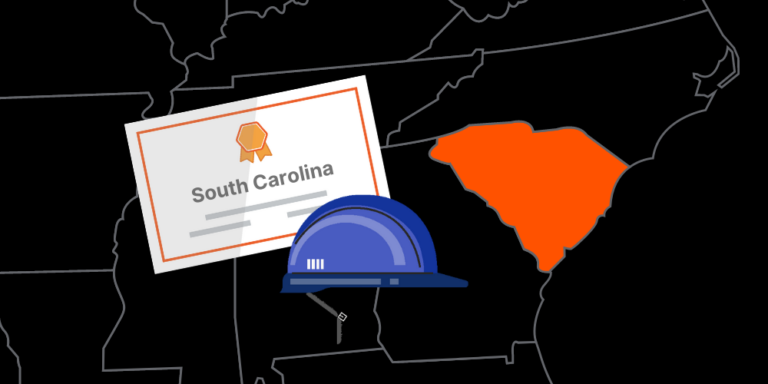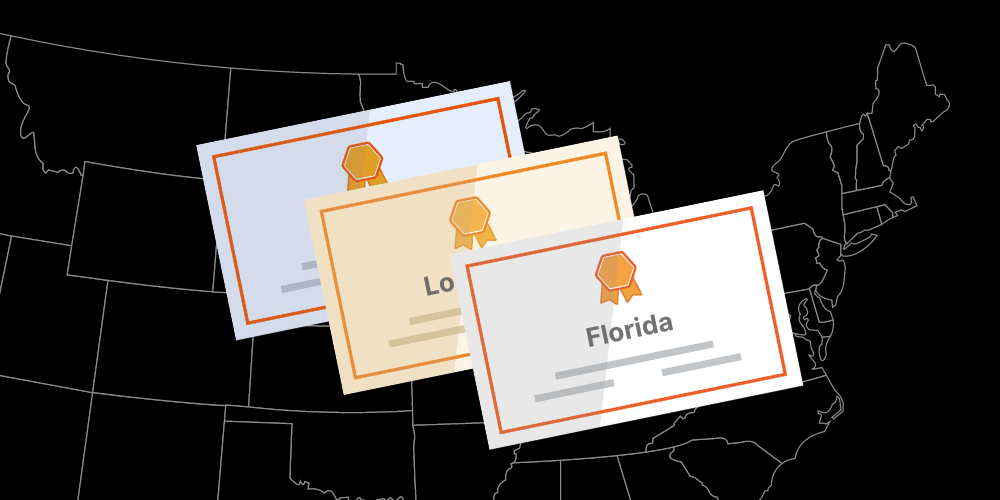— 6 min read
South Carolina Contractor Licensing Guide
Last Updated Nov 16, 2023

South Carolina requires that most contractors obtain a license when performing work in the state. Three different kinds of licenses — general contractor (for work valued over $5,000), residential home builders, and residential specialty contractors — are available depending on the type of work you'll be performing.
All of these licenses are governed by the South Carolina Contractor License Board (SCCLB), which has strict requirements for licensure, including applications, examinations, and proof of insurance.
We'll cover everything you need to know about South Carolina contractor licensing so that you'll be on your way to starting a successful contracting business.
Contents
Table of contents
How to get a contractor license in South Carolina
General and mechanical contractor licensing
General and mechanical contractors who want to work on commercial and industrial projects valued at over $5,000 need to carry a license (the license also allows them to work on residential jobs). These licenses fall under the control of the South Carolina Contractor’s Licensing Board.
Eligibility for one of these licenses hinges on a few factors. For one, most applicants will have to take an exam (or several), which includes business and law as well as trade-centric sections. A third-party contractor, PSI, handles the examination process, and it’s the first step in becoming a licensed general or mechanical contractor.
The second factor is being able to prove two years of work experience (within the last five years) in the trade for which you’re applying. This does not need to be the business owner or applicant’s experience, but a Qualified Person employed by the business. Applicants who meet those standards can apply using this application.
The application
For the most part, the application for licensing is fairly straightforward. Applicants will have to provide information such as licensee identifying information, Qualifying Person identifying information, and the type of business structure of the company. There are two areas that might get tricky; the license type and financial statement sections.
General contractor licenses include several types and specialty classifications:
- Building construction, including:
- Boring and tunneling
- Concrete
- Interior renovation
- Marine
- Masonry
- Railroad lines
- General roofing
- Specialty roofing
- Structural framing
- Highway, including:
- Asphalt paving
- Concrete paving
- Bridges
- Grading
- Highway incidental
- Public Utilities, including:
- Pipelines
- Water and sewer lines
- Water and sewer plants
Mechanical contractor licenses cover fewer trades:
- Heating
- Air conditioning
- Plumbing
- Electrical
- Refrigeration
- Lightning protection systems
- Pressure and process piping
- Packaged equipment
Along with the license type, general and mechanics contractors have to choose a Group Limit. The group limit chosen allows them to choose between submitting financial statements or securing a bond. There are different tiers of limit types, and with each ascending tier, there are more stringent financial statement requirements or higher bond amounts.
Learn more: 4 Financial Statements For Contractors
Applicants must also send in the application fee, which varies between $175 and $350: If you’re applying for a license with more than 12 months left in the license period, the fee is $350. For less than 12 months left in the license period, the fee is $175. Licenses are good for two years, with general contractor licenses expiring on even years and mechanical licenses expiring on odd years.
Once complete, mail in the application and license fee to:
SC Contractors Licensing Board
PO Box 11329
Columbia, SC 29211-1329
Residential and specialty contractors
Licensing applicants who only want to work on residential projects have a different avenue to navigate. These licenses (or registrations) fall under the Residential Builders Commission, and the rules are slightly different from General and Mechanical licensing.
In order to qualify for a license, contractors must have one year of Commission-approved experience under the supervision of a licensee. Applicants who want to take the appropriate trade exam must first apply to the Commission for review and approval.
Residential Builders need to use this application. They’ll have to provide identifying information for the applicant, proof of a surety bond valued at $15,000 or more, work experience information, as well as business identifying and structure information. The application fee is $100, and should the Commission approve the application, an additional licensing fee applies:
- $160 if the license is issued on or between July 1, even-numbered year to June 30, odd-numbered year
- $80 if the license is issued on or between July 1, odd-numbered year to June 30, even-numbered year
Specialty contractors need to use this application. Much of the same information applies, including identifying information and work experience. However, specialty contractors need to secure $5,000 bonds and choose up to three classifications:
- Vinyl/Aluminum Siding
- Floor Covering
- Carpenter
- Insulation Installer
- Masonry
- Stucco Installer
- Roofing
- Drywall Installer
- Painter/Wallpaper
- Solar Panel Installer
The application fees for these licenses are:
- $100 if the registration application is received on or between July 1, odd-numbered year to June 30, even-numbered year
- $50 if the registration application is received on or between July 1, even-numbered year to June 30, odd-numbered year
For residential electrical, HVAC, and plumbing contractors, the requirements are much the same as specialty contractors, including the bond amount ($5,000) and the identifying information, though fees do change. Each license type also has its own application:
- Electrical contractors must use this application
- HVAC contractors must use this application
- Plumbing contractors must use this application
The fee for the application is $100, but upon application approval and successfully passing the exam, the following licensing fees apply (note: they are reversed from the Residential Builder fee schedule):
- $160 if the license is issued on or between July 1, odd-numbered year to June 30, even-numbered year
- $80 if the license is issued on or between July 1, even-numbered year to June 30, odd-numbered year
Penalties for unlicensed contracting in South Carolina
There might be quite a few license types and options available to contractors in South Carolina, but compared to other states, the process can be fairly straightforward and the requirements are minimal. But South Carolina takes unlicensed contracting seriously.
Contractors who perform work without the appropriate license are subject to fines of up to $250 for the first offense. But, a second offense can be much more severe, as it will bring your case before the Board.
Additionally, unlicensed contractors who are supposed to carry licenses don’t have lien rights in South Carolina. In other words, it doesn’t matter if a contractor meets every requirement within a contract, builds a structure perfectly to code, and delivers the job on time. If that contractor was supposed to have a license but doesn’t, they have no right to file a lien against the property in the event of non-payment.
Categories:
Tags:
Written by
Tom Scalisi
57 articles
Tom Scalisi is a writer with over 15 years of experience in the trades. He is passionate about educating contractors and specialty contractors about the best practices in the industry. He has seen first-hand how education, communication, and preparation help construction professionals overcome challenges to build a strong career and thriving business in the industry.
View profileExplore more helpful resources

Contractor License Bonds: Everything You Need to Know
In order to perform construction work, many states require contractors to be “licensed and bonded.” What does that mean? Well, every state sets its own rules for contractor licensing, and...

Contractor’s Guide to License Reciprocity: Working Across State Lines
For many contractors, growing a construction business means taking on jobs in different states. Whether it’s to take a one-off project or to establish a new business location, working in...

Vermont Contractor License: Guide to Rules & Requirements
If you’re starting a construction business in Vermont or looking to expand your business from another state, being properly licensed to work is one of the first key steps. There...

The Maine Contractor License: Guide to Rules & Requirements
If you’re considering starting a contracting business in Maine, it’s important to know the rules and requirements for proper licensing. Maine takes a different approach to contractor licensing than most...
